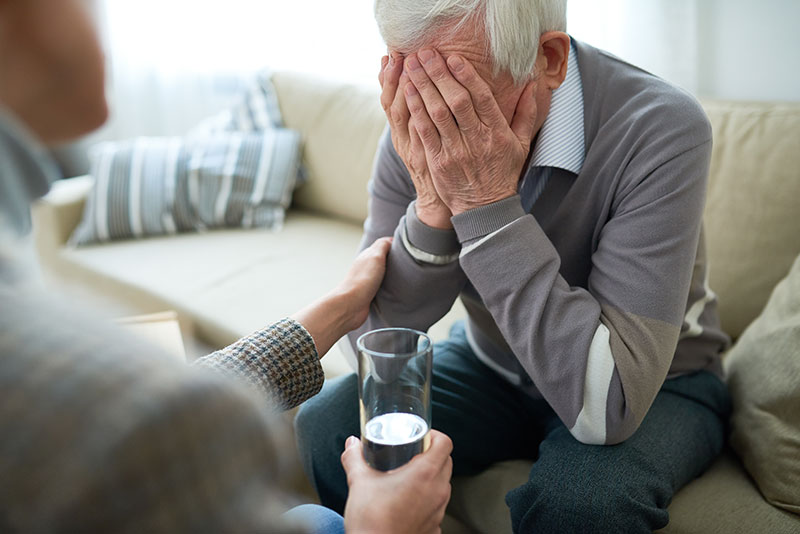Supporting Seniors Through Grief and Loss
Grief and loss are unavoidable, but they often hit seniors particularly hard. As we age, losses become more and more frequent — friends, siblings, spouses, even the loss of health or independence.
No matter how many losses we go through, it never becomes easier, and as those griefs pile on, it’s easy for seniors to slip into depression or lose their zest for life. That’s why it’s important to support your senior loved ones through the grieving process.
Understanding Grief in Seniors
Grief can be more challenging for older individuals. For one, they often lose people who they’ve known for decades or their entire lives. The loss of a spouse is incredibly difficult for anyone, but for seniors who face the idea of living alone for the rest of their lives, without the partner who may have been by their side for 50+ years, it’s especially devastating.
In addition, seniors may experience other types of significant losses, like the loss of their health, mobility, or independence. While these may not seem as impactful as the death of family members or friends, many people still go through a period of grieving while processing the loss.
How to Help Seniors Through the Grieving Process
When someone close to us experiences a loss, we want to be there for them, but it can be hard to know how to help. Often, they’re not in a place to even articulate what it is that they need. If your senior loved one is going through the grieving process, these tips can help you support them more effectively.
Listen and Acknowledge
One of the most important things you can do is to offer a listening ear. Really, actively listen. Let them talk about their feelings or reminisce on old memories. Acknowledge their loss and their pain. You’re not there to offer solutions or quick fixes — there are no quick fixes or answers for grief. You’re simply validating their emotions and letting them know they are not alone, that you’re there when they need to talk.
Encourage Expression of Feelings
Some seniors, especially men, may be resistant to expressing their emotions. They may even feel like they shouldn’t make a big deal out of their losses because they’re an inevitable fact of aging. But keeping their feelings bottled up will only delay the grieving process and make it harder for them to live the rest of their lives to the fullest.
So encourage your loved one to express their grief in whatever way feels right for them. It could be talking, writing, art, music — or even taking them to one of those venues that lets you smash dishes or sling paint at the wall — whatever works for them! Expressing those feelings and letting them out is a key part of the healing process.
However, it’s important to respect their pace and mode of expression. Encourage, but don’t push or coerce.
Maintain Routines
While it’s important to acknowledge your loved one’s grief and give them time to process, maintaining a regular routine can provide a sense of stability and normalcy. If they’re up for it, encourage them to continue their daily activities as much as possible, while being flexible to accommodate their needs and emotions.
Promote Social Connections
Isolation can exacerbate grief, and loneliness is already a common issue for seniors. So encourage your loved one to stay connected with family, friends, and their community, but make it a point to have people in their social circle reach out as well. Grief can make us self-isolate, and some seniors may feel like they aren’t in a place mentally to be social or don’t want to be a burden.
Support groups can be especially effective, giving them a place to talk to people who understand exactly what they’re going through, but normal social activities and regular contact with loved ones can help as well.
Offer Professional Support
Sometimes, professional help may be necessary. If your loved one is struggling to get through the grieving process or experiencing signs of depression, don’t hesitate to encourage counseling, therapy, or support groups that specialize in dealing with grief.
However, keep in mind that some seniors still have stigmas surrounding mental healthcare, so you may need to approach the topic delicately. If they are religious, counseling sessions with a trusted pastor or church leader may be a good avenue to look into.
Encourage Physical Health and Wellness
Physical health can impact emotional well-being, but self-care often falls by the wayside when dealing with loss and grief. If possible, make sure your loved one is eating a regular, healthy diet, exercising or getting some kind of physical activity, and getting adequate sleep.
Setting them up with meal trains, grocery delivery services, or even restaurant delivery services can be helpful in ensuring your loved one is eating regularly. You can also incorporate walks or other physical activity into your time together. Many people find it easier to open up and share when they’re engaged in another activity.
You may also want to ensure they’re keeping up with doctor appointments and taking any prescribed medications.
Discover New Purpose
The loss of close friends and family members can leave seniors grappling with their own mortality. They may feel purposeless, like they’re just waiting for their life to come to an end as well.
So helping your loved one find new purposes or activities that they enjoy can be a powerful antidote to grief. Volunteering, taking up a new hobby, joining a club, or even getting a pet can give them a new lease on life and something to look forward to.
Right Hand Senior Care: Supporting Your Loved One Through All the Seasons of Life
It can be challenging to support your loved one through the grieving process, but Right Hand Care’s compassionate caregivers can help. Our dedicated caregivers provide not only physical assistance but also companionship and emotional support. With our affordable in-home care services, you can rest easy knowing that a caring companion is by your loved one’s side, even when you can’t be.
For more information on our services or to set up a care plan, contact us today.

We are Superheroes in Comfortable Clothes™
We take care of our clients, their families, our staff, and our league of franchise owners.

